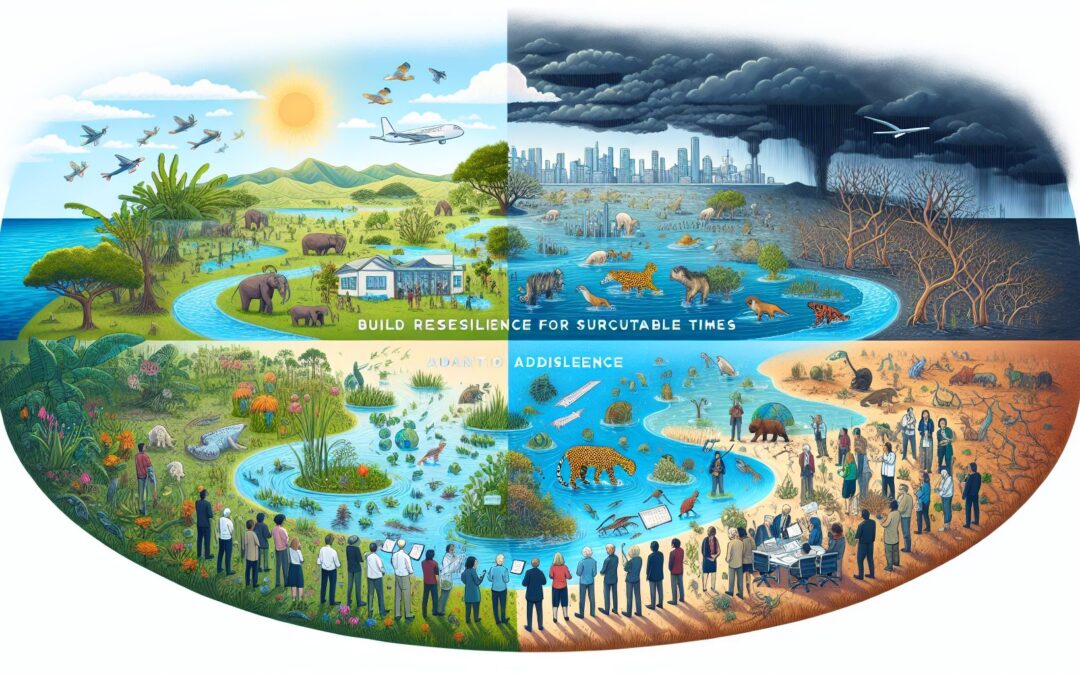Climate change is no longer a future problem – it’s occurring right now, and it’s wreaking havoc on our planet’s water systems. With the rise in heat-trapping gases in the Earth’s atmosphere, significant changes are occurring in our water system, which is alarming, given that water covers 71% of our planet and is indispensable for life. Hence, the urgency to focus on ‘Water and Climate Change Adaptation‘ can’t be emphasized enough.
Understanding Water and Climate Change
There’s a symbiotic relationship between water and climate change. The increase in global temperatures due to climate change causes quicker evaporation rates, resulting in severe water stress in many parts of the world. On the flip side, when water is misused or abused, greenhouse gas emissions increase, causing further climate change.
According to the ‘Special Report on the Ocean and Cryosphere in a Changing Climate'[1] by the Intergovernmental Panel on Climate Change (IPCC), around 1.2 billion people are already at risk due to rapidly changing water systems. This figure is set to increase exponentially unless we make massive changes.
Climate Change Adaptation – What Does It Mean?
Adapting to climate change involves making decisions and taking actions to mitigate the potential negative impacts that could result from climate change identified through vulnerability assessments.
While reducing greenhouse gas emissions is one part of climate change mitigation, focusing on the judicious use of water resources is also paramount. This calls for the need to steadfastly foster ‘climate-resilient water management‘. This involves effective planning, managing, distributing, maintaining, and protecting our water resources to curb the detrimental impact of climate change.
Strategies for Climate-Resilient Water Management
Here are some strategies we could adopt to build resilience in uncertain times.
Upgrading Infrastructure
Updating our water infrastructure could significantly improve our resilience to climate change. Improved irrigation techniques, better household water appliances, and restoring & protecting our natural water bodies all play pivotal roles in this.
Rains, A Valuable Asset
Treating rainwater as a valuable asset and not a waste product could be the stepping stone in managing our water crisis. Rainwater harvesting and greywater recycling systems can offer sustainable alternatives to tackle water scarcity.
Mitigating Pollution
Water pollution is another critical consideration for climate-resilient water management. Reducing direct chemical discharge into our water bodies, promoting biodegradable alternatives to plastics and microplastics, and improving wastewater treatment facilities could all provide long-term benefits.
Community Engagement and Education
Community engagement plays a vital role in promoting sustainable water management, too. Encouraging water conservation practices, promoting efficient water usage, and educating communities on the reality of the water crisis help foster a culture of sustainability.
Global Efforts in Building Resilience
Thankfully, there’s a global push towards addressing the water-climate crisis. The ‘Global Water Partnership'[2] (GWP) has established a number of initiatives including the ‘Water, Climate, and Development Programme’ (WACDEP) for Africa, and similar programs are also starting in Central Asia, South Asia, and the Caribbean. These initiatives focus on integrating water security and climate resilience into development planning and decision making.
In Conclusion: Building Resilience, Forging Our Future
The time for debate is long past us. It’s time to build resilience and adapt to the changing realities of our planet. Remember – when it comes to climate change and water, we’re all in the same boat. Resilient water management will call for worldwide cooperation, and only by working together can we build a resilient and sustainable future.
We have the wisdom, knowledge, and technology to deal with this crisis. We must choose to use them in a smart and sustainable manner. We owe this not only to ourselves but to future generations who will inherit the consequences of our actions today.
Sources:

